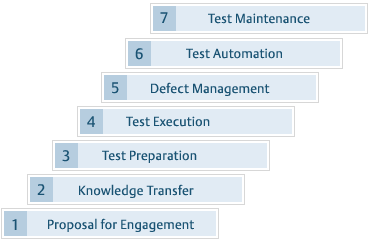In a drive to give operational excellence, which is of paramount importance, the banking and financial sector is looking for solutions that could address the challenges they are facing:
- Implementing more rigor within risk management and corporate governance from board level downwards
- Building on opportunities from market concentration and globalization
- Focusing on the need to gain operational synergies from mergers and acquisitions
- Responding to regulatory and government changes and leveraging these changes to provide business opportunity
- Improving customer service and customer retention
- Reducing operating costs across both the business and IT
- Implementing technological changes such as Vista and SOA based solutions
Software vendors often focus on software development activities, which leave them with very little time to develop testing competencies. As a bank, you might find that they lack proven processes and methodologies, and ready test teams to execute your testing projects as efficiently as a specialist independent testing partner can.
We have a track record of over 14 years in successfully executing software testing projects for Global 500 banking and financial services clients across the world (translating to over 10 Million person hours of testing experience). Over the years, we have created (and are continuously improving) Test Processes and Methodologies that comprise:
- Metrics-driven testing processes
- Standardized documentation of test ware
- Effective systems of reviews
- Optimum usage of automation techniques
Our vast experience with testing projects has helped us to evolve numerous best practises which differentiate us from system integrators who also offer testing services. These form the foundation of our Seven Step Methodology that minimizes project risks and streamlines testing delivery to your satisfaction. Your partnering with us for testing services provides for effective and comprehensive planning and execution of testing projects.
Seven Step Delivery Model

Step 1 - Proposal for Engagement
In this step, we define the terms of reference, customer expectations, project scope & commitments, and the overall project framework.Step 2 - Knowledge Transfer
In this step, our domain experts/business analysts will ensure that the critical activity of knowledge transfer, both domain-specific as well as project-specific knowledge, takes place smoothly and with the least possible effort.Step 3 - Test Preparation
In this step, which runs parallel to the software development activity, our team works with you to produce test strategies, test cases, traceability, test scripts, test data guidelines and Run Plans. Parallel preparation helps compress project timelines.Step 4 - Test Execution
In this step, we carry out actual testing based on the test start and completion criteria. Experienced test teams work together to ensure flawless and timely completion of the project.Step 5 - Defect Management
In this step, we take care of defect management and track defects systematically to closure. We also produce test logs, defect summaries, status reports and defect analyses.Step 6 - Test Automation
In this step, we select and deploy appropriate tools for automating regression testing and performance testing. Test execution productivity is considerably enhanced by the use of automatic tools.
Step 7 - Test Maintenance
In this step, we implement a process and a stable framework for handling on-going release testing requirements on a long-term basis
No comments:
Post a Comment